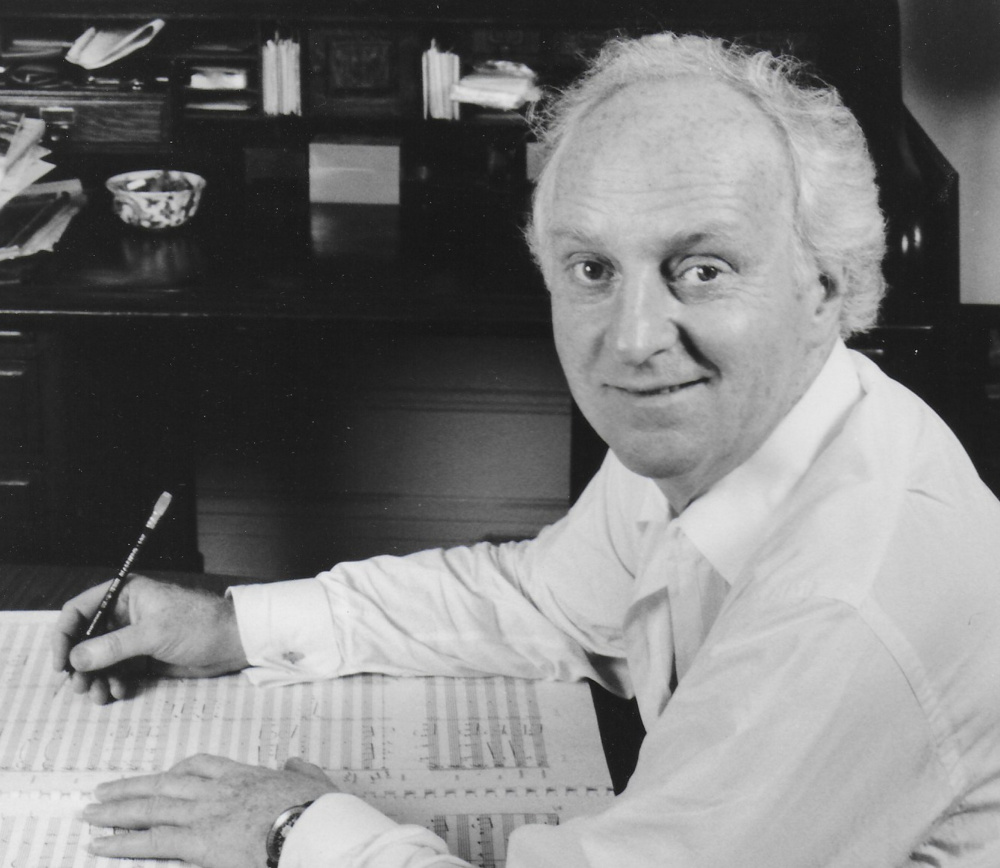John Duffy, an Emmy award-winning composer who penned more than 300 works of music for symphony orchestra, television, theater and film, died Tuesday of complications from cancer. He was 89.
Duffy, who lived in Camden for roughly 25 years, was co-founder in 1974 and president of Meet the Composer, now called New Music USA, an organization based in New York City that supports the creation, performance and recording of works by American composers.
He was described in his obituary as an “audacious advocate of the arts and the underdog, who built his reputation not just on his compositions but on fighting for the rights of others.”
“He was a precious man in our community and in our lives,” said Dr. Dorothy Foote of Camden, a close friend. “He was larger than life. He had an innate sense of social justice in everything he wrote.”
Many of Duffy’s pieces were inspired by the social justice causes for which he advocated.
In the 1960s, he was commissioned by the United Church of Christ to compose a piece celebrating the founding of six black colleges. He composed for numerous Broadway and off-Broadway productions such as “Horseman Pass By,” “Freeman Freeman” and “The Ginger Man.”
Duffy also won two Emmy Awards – the first in 1979 for the NBC special, “A Talent for Life: Jews of the Italian Renaissance.” The second he won in 1984 for the nine-hour PBS series, “Heritage: Civilization and the Jews.”
He also won numerous other awards including a New York State Governor’s Art Award, and an honorary doctorate from Old Dominion University in 2013.
As president of Meet the Composer, he initiated programs that promoted the work of young composers. Foote called it a daring move.
“He was fearless in his pursuits in all ways,” she said in an interview Wednesday. “He really supported up and coming composers by saying they need to be paid a living wage. He fought for musicians, conductors and individuals in the music industry to have power. He was a fearless advocate.”
New Music USA commented on Duffy’s passing Tuesday saying, “You could talk to John for only a few minutes before feeling the energy, the power, the almost talismanic specialness that he conferred on composers.”
Mr. Duffy was commissioned by the Sierra Club to compose, “Symphony No. 1 – Utah,” which premiered at Lincoln Center in 1990, according to his obituary. He was also commissioned by the U.S. Department of the Interior to create “A Time for Remembrance,” which commemorated the 50th anniversary of the attack on Pearl Harbor.
“A lot of his music has themes that center around uplifting greatness in American history,” said Glenn Jenks, a close friend and musician from Camden. “I’m inspired by his constancy and his dedication to the issues that he saw were the most important in his life. He lived it all the time. He lived it through his music and his daily life.”
After Mr. Duffy retired, he continued to compose, writing works such as the string quartet “We Want Mark Twain,” and “Black Water,” an opera based on the Ted Kennedy/Chappaquiddick incident, with libretto by Joyce Carol Oates, according to his obituary.
“If you really read into any of his work, you can read his compassion and wish for equity for marginalized individuals,” Foote said. “He brings it out in a big way.”
He was a longtime member of the board of incorporators for of Bay Chamber Concerts in Rockport. Jenks said Duffy’s passing is a great loss.
“It was truly expected, but it’s a great loss,” Jenks said. “It’s a great loss for everyone. He was all about social justice. His music was that way, but he was that way. He brought it to every single conversation I ever had with him in some way, shape or form.”
Around 2012, he moved to Virginia to care for his former wife. There, he became active in the Virginia Arts Festival. He created the John Duffy Composers Institute in conjunction with the festival to help train young composers.
In lieu of flowers, the family asks that contributions be made to the John Duffy Composers Institute c/o the Virginia Arts Festival.
Send questions/comments to the editors.




Success. Please wait for the page to reload. If the page does not reload within 5 seconds, please refresh the page.
Enter your email and password to access comments.
Hi, to comment on stories you must . This profile is in addition to your subscription and website login.
Already have a commenting profile? .
Invalid username/password.
Please check your email to confirm and complete your registration.
Only subscribers are eligible to post comments. Please subscribe or login first for digital access. Here’s why.
Use the form below to reset your password. When you've submitted your account email, we will send an email with a reset code.